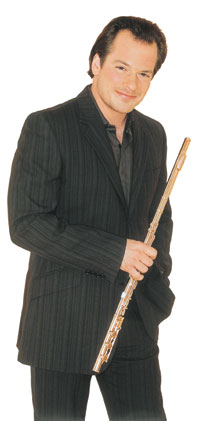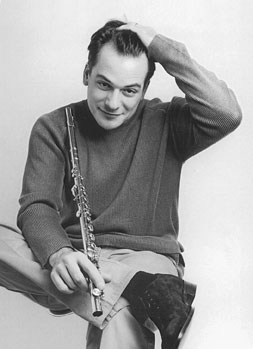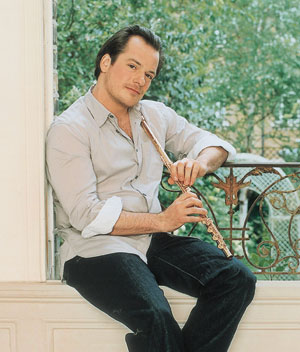
In November Emmanuel Pahud, came to Chicago to perform and give a masterclass at the Chicago Flute Club’s Flute Festival 2007. The concert he performed with pianist Eric Le Sage at DePaul University’s concert hall, gave new meaning to my collection of Pahud recordings.
Pahud won the principal position in the Berlin Philharmonic in 1992 at the tender age of 22, and with the exception of an 18-month sabbatical to teach at the Geneva Conservatoire, he has been there ever since. He has appeared as soloist with most of the world’s leading orchestras, including the London Philharmonic, Washington National Symphony, Tokyo Symphony Orchestra, Zurich Tonhalle, Bayerischer Rundfunk, and the Berlin Philharmonic. He began recording exclusively with EMI Classics in 1996, producing not only classical recordings, but crossover projects such as Into the Blue with jazz artist Jacky Terrasson.
As a child prodigy, Pahud quickly amasssed a long list of prizes, rave reviews, and recorded performances. He was raised in a cosmopolitan environment by a French mother and Franco-Swiss father, who traveled extensively. As a result of living in so many countries, he speaks French, English, German, Spanish, and Italian fluently.
An International Childhood
“I was born on January 27, the same day as Mozart and Roger Bourdin, a French flutist who died very early. It was Bourdin who recorded Debussy’s Trio with Arthur Grumiaux, the famous Belgian violinist. Other flutists born in January include Michel Debost on the 20th and Aurele Nicolet on the 22nd.
“Soon after I was born we moved to Baghdad for awhile, then to Paris, Madrid, and Rome. My father worked for an American telephone company, I.T.T., which was active worldwide, and that’s why we moved so much. My first schooling was in Rome, and then in Brussels for seven years. Because we were French and Swiss and had lived in Italy, Spain, and Belgium, we virtually traveled all across Europe, which was extremely enriching for me as a child.
“From the beginning I was aware that there are people out there who speak other languages, behave in different ways, and have different habits and traditions. This has helped me to feel comfortable in any place in the world. I have lived in Berlin for 15 years and feel very comfortable there. I have not lost my roots. I’m just comfortable wherever I am.
“Rome was where I first heard a flute – at a neighbor’s flat. I asked my parents, ‘What’s that? What am I hearing?’ They knew it was flute, but didn’t know what piece. They went to ask, and the neighbors said, ‘Our son Philippe is playing the flute and practicing Mozart’s G Major Concerto.’ I told my parents, ‘I want to play the flute. I want to play the Mozart G Major Concerto.’”
So at the tender age of six, Pahud began studying with his upstairs neighbor and then with François Binet, who along with flutists such as Nicolet, Lardé, and Graf, was a former student of André Jaunet and Marcel Moyse during the late 1940s. Pahud continued flute lessons in Brussels, first with Michel Moinil and then with Carlos Bruneel, who was principal flutist in the Brussel’s Opera. At 15 Pahud won the Belgian National Competition and played the Mozart G Major Concerto with the orchestra conducted by André Vandernoot. Two years later, he won Belgian television’s Tenuto International Music Competition.
Becoming a Professional Flutist
At 17 he entered the Conservatoire National Supérieur de Musique de Paris and studied with Michel Debost, Alain Marion, Pierre-Yves Artaud, and Christian Lardé, graduating in 1990 with the Conservatoire’s Premier Prix. While still at the Conservatoire, he won various international competitions and received his first major professional appointment as principal flute of the Basel Radio Symphony under Nello Santi. From that point his career moved forward with lightening speed. In 1991 while still working with Aurèle Nicole, he played principal in the Munich Philharmonic. A year later he won the Geneva International Competition and one month later won the principal flute audition for the Berlin Philharmonic.
“Being a professional flutist didn’t just come to me; I took the opportunity when presented with it. I made the commitement, and accomplished my goal, and for that I am proud. These are good times in my life. I enjoy meeting people and playing with them, without any language problems or barriers. That is quite easy to do with music.
“If you want to develop, you need goals, but you should also understand that they may not be fulfilled. Sometimes we have to adjust our goals permanently, depending on what kinds of opportunities arise. When you set just one goal, and opportunities call you in a different direction, the opportunities go by without being developed.
“I have always been careful about the future. I was committed to doing whatever I did well, and to developing myself as a human being, as a musician, and as a performer. But I never thought that I would be a professional flutist. I didn’t dream of becoming principal in an orchestra, let alone the Berlin Philharmonic. A solo career was never my goal either. I just wanted to play the flute. That’s what I told my parents when I was five. I didn’t say I wanted to become a flute player.”
 Not all parents would take easily to the idea that their child wanted to pursue a music career, given the difficulties and struggles often prevalent for most aspiring musicians. Pahud was fortunate to have encouraging parents, who didn’t hold him back. “They were concerned. However, both of them had wanted to play musical instruments when they were kids and were unable to because of World War II. They just wanted to make sure that I finished my regular studies and graduated from high school. Once I had that diploma in my pocket, they allowed me to dedicate myself to music. I was only 17, but I left Brussels for the Conser-vatoire. It was fantastic because I lived on my own.”
Not all parents would take easily to the idea that their child wanted to pursue a music career, given the difficulties and struggles often prevalent for most aspiring musicians. Pahud was fortunate to have encouraging parents, who didn’t hold him back. “They were concerned. However, both of them had wanted to play musical instruments when they were kids and were unable to because of World War II. They just wanted to make sure that I finished my regular studies and graduated from high school. Once I had that diploma in my pocket, they allowed me to dedicate myself to music. I was only 17, but I left Brussels for the Conser-vatoire. It was fantastic because I lived on my own.”
Performance Injuries
When asked if he had encountered any physical difficulties with the flute, he replied, “So far, not that much; I have had no injuries. I am still improving, gaining more control over the instrument, and therefore the struggle is more behind me, but I remember that I practiced a lot when I was doing international competitions before I started auditioning for orchestras. My first job was in Basel, and I practiced about seven to eight hours per day – only me and the flute.
“Practicing shouldn’t cause injury. If it does, you have a basic problem or a bad position. Flute is more natural than the other wind instruments. It’s a little bit on the side, but it’s not a far stretch. You have to bring the flute in front of you to become one with the sound and your body – not to play on the flute but to play with the flute. The instrument becomes an extension of the air and of your own breath. Also, the flute has no resistance – indeed it is the only open wind instrument by its acoustic construction. This makes the flute very similar to voice.
“The only tension that a player might feel is in the neck because of the asymmetrical posture, but I recommend exercise to compensate for that. Unfortunately people don’t talk about these things to students. Young players should be aware of this to avoid performance injuries when they are older, and it is mostly too late to do anything about it.”
Although Pahud is fortunate to never have suffered a performance injury from many hours of repetitive practicing, he did have one recent brush with a near crippling ear virus. “In 2007 during the summer I had a virus that got stuck in my inner ear, and I lost 80% of my hearing in the right ear. I heard noises that had nothing to do with what I should have been hearing, which was really scary. I didn’t know what to believe, what I saw or what I heard. I looked at someone playing the violin but it sounded as if he was playing something else. I stood in front of a piano, played with other instruments, but just played by feeling – not from what I heard. It was painful. Because of all the tension, a nerve got irritated in my neck, and I had to go through two months of medical and manual therapy, all because of the conjunction of a cold, fatigue, and a stupid virus. I was lucky to recover, but I thought seriously about career alternatives in the three weeks that I stopped playing.”
A Busy Schedule
Pahud travels for most of the year, playing over 150 concerts, “I like being on the road, but after 20 years of it, I try to minimize the lost time of transfers and waiting in the airports with good books. I mostly like philosophical novels that give an insight into thoughts that might not have occurred to me otherwise. I don’t have one favorite book, composer, or whatever. I’m just interested in what I’m reading now, where I am right now, and what I am thinking about. I think it is important not to be distracted by all the rubbish that goes on around us, yet remain aware of any interaction available with the environment.”
Between his hectic concert schedule and two young sons, he doesn’t have time to teach, except for guest masterclasses. “I am just too busy and enjoy making music too much right now. Perhaps I will teach when I cannot play the flute in a way that makes me happy.”
Articulation and Vibrato
His ideas about articulation and vibrato are very organic, with a philosophy that incorporates articulation within the air stream so that the movement of the tongue is only an accessory to the air itself. “I think we focus too much on the tongue, which is just in the way of the air stream. It’s as simple as that: no air, no sound! Very often you hear people using double tonguing with hard Ts and Ks. Every time they play legato it is loud, and when they play stacatto, it’s not loud because the tongue stops the air most of the time. The tongue should surf on top of the air stream. It doesn’t matter whether you use the tip between the lips or behind the teeth. The most important thing is that the tongue motion be small. I use all variations, from no tongue at all to the tongue in the mouth – on the top or the bottom – to the front and to the back. What makes the difference between a long and short note is when you stop blowing and how and when you lift the note.”
For Pahud, vibrato reflects personal taste and personality rather than national trends. “I think you can recognize a player instantly from his vibrato, not necessarily by country or flute school, but by personal preferences. Often people play with an automatic vibrato. As soon as they hold a note for more than half a second the vibrato turns on. I’ve practiced to the point that the air stream is independent of what my fingers do. The vibrato should only relate to the air stream and not to the fingers.
“Vibrato should happen naturally and not be physically organized by muscles in the throat, belly, or diaphragm. I think vibrato relates to the way the air stream flows in the body; there is a kind of turbulence zone before the air goes through the mouth. This turbulence makes the vibrato. That’s the way it feels to me.”
 Thoughts on Competitions
Thoughts on Competitions
Pahud’s success in major competitions placed him in clear view of the upper echelon of the Classical music world. Many musicians and teachers have mixed views of competitions. They can provide goals and performance experience for students as well as potential professional benefits, yet can also wreak havoc on players’ self-esteem. Pahud sees a major benefit to them when the student and competition are mutually appropriate.
“It depends upon whether you are talking about music-making or flute playing. Competitions let you know where you stand compared to various standards – local, regional, national, and international. They are a good thing because you know whether you belong to the serious people of your generation or not. If you get bad results in certain competitions, you might want to think about doing something else, or changing something, or maybe thinking, it’s just not the right moment, so why did my teacher send me there?’ That’s the responsibility of the teacher. Competitions are not good for everybody. Some players are just not good at them even though they are great musicians.
“I did many competitions and was fortunate enough to get a prize in all of them. Each win confirmed the previous one, with a different jury, different situation, and different repertoire. That was important because not many people in my generation have won two or three international competitions. It placed me in a position where people started to listen, and I became a young professional through the experience. Concert dates throughout Europe and Japan became available and in America a little later. It is after the competitions that you have to play really well.
“Playing well in a competition is nothing more than performing a recital. When you play lots of recitals, you compete with all the other musical events. Many competition winners think, ‘I am the best of my generation,’ and they stop practicing. But this is exactly the moment when they should start practicing because this is when they start getting the attention from professionals.”
The U.S. vs. Europe
Speaking about the music training system in the U.S., Pahud notices a decline in the playing level. “How can you study when tuition is so high? People from wealthy families get better instruments and study with private teachers, but that doesn’t mean that they learn more, are smarter, or more musical. I’ve seen American students become music majors because they played the flute and their parents paid the tuition. The instrumental level required to become a music major can be quite low at some institutions. Some of these kids are just wasting the best years of their lives, and their teachers are wasting their time and energy. It does no good to the music world either.
“All of them get the same diploma, but they are not all professionals. Some are not even good enough to be called amateurs because they didn’t care enough to work hard in college. For them, it was the easiest thing to do at the time. A system that allows such things to happen is not good. Unfortunately, there are too many people who study for a long time without getting anything out of it. They are qualified, but they will never get a job.
“I’m not referring to interpretation when talking about playing levels, but about the basics of playing the rhythm, playing in tune, and playing with a nice tone. I am shocked to see how many so-called, young professionals are unable to do this. This exists in every country.
“When you have a system in which more than half of the graduates eventually end up doing another job, something is wrong with the system. We should train fewer people, but train them better. It has to be competitive to keep it healthy and maintain a certain quality. What I’m saying is not politically correct, but the better we perform on stage, the more people are going to like coming to the concerts.
“Eventually it’s all about personality. You can always recognize great musicians right away; they bring something very personal to the music. Whether it’s Karajan conducting, Callas singing, Jim Galway playing, or Julius Baker, Michel Debost, Jean-Pierre Rampal, or Nicolet, you recognize them instantly. These are just great personalities. They present the music in a very personal and individual way. This is something that we forget in the training.
“We set a standard and then format everybody with the same knowledge. Some players pick it up easily, and once they’ve got it, they move on to the next step. With other students, teachers have to repeat and repeat and repeat, and eventually it might stick, or not. These are very different personalities, and I think they are entitled to different tuitions. How society and music studies are organized is very difficult within the structure of our Western world.”
In assessing the level of U.S. professional flutists, Pahud is complimentary, yet he perceives a difference in the manner U.S., Canadian, and British flutists approach orchestral work as opposed to their colleagues in Europe. “I think there are very good players in the U.S. There are several generations of Julius Baker’s students, and it’s always great to see new personalities arising. What is striking to me is that there is a major difference in the criterion for making a good musician in continental Europe versus the Anglo-Saxon world, which I would say is England, the U.S., and Canada.
“Orchestra jobs are numerous and prestigious, and it is a big artistic responsibility to play at your best while delivering consistent performances. These musicians are not only steady as a rock, but they also set a standard and match it every time.
“In Europe this is considered fantastic when it happens, but it is not at all what makes a musician. When we hire a musician, we don’t look for someone who plays at the same standard every time. Rather, we look for someone who can deliver something personal and individual, who can be very different from time to time, depending on the conditions. After all, we are not in the same mood, in the same city, or with the same people every time. This is the big discrepancy in the way flute playing and music making has developed in Continental Europe.
“Stars are far beyond any particular school of flute playing. The stars of the French, English, or American flute players do not represent their own school, basically because they have escaped. Music goes beyond the limitations of being in one school.
“Playing the flute from just one system is a limitation. You should play Taffanel-Gaubert or Reichart Daily Exercises as if they were from a Beethoven symphony, a Mahler symphony, a Mozart concerto, and a Poulenc or Prokofiev sonata; the styles are all there. It’s exactly the same stuff, just in a different context. So start making music with the daily exercises and you’re on the way to becoming a good musician.”
Although Pahud seems born to be a flutist, he once dreamt of another profession. “I would have loved to become a pilot. I enjoy fast things; driving an Indy car or flying would have been great. On the other hand, I’m really interested in anything that has to do with music management and the music world. After 15 years in the Berlin Philharmonic, I am now a member of the orchestra board. Because the orchestra is self-run, this means I am one of the bosses. The job includes managing the T.V. and media appearances and extra projects. If I ever stop playing the flute, I have many other things to do.”






